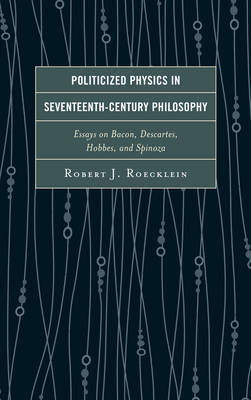
Politicized Physics in Seventeenth-Century Philosophy
Essays on Bacon, Descartes, Hobbes, and Spinoza
Seiten
2017
Lexington Books (Verlag)
978-1-4985-5653-8 (ISBN)
Lexington Books (Verlag)
978-1-4985-5653-8 (ISBN)
In the origins of Western philosophical thought, doctrines of physics intertwined with the debate between political philosophers. It is for this reason that Plato devoted his dialogues Theatetus and Parmenides to investigating and meeting the arguments of his principal philosophical adversaries. The doctrine of atomism, which developed under the influence of Parmenides’ philosophy, is one that Plato refutes directly. In the modern era of philosophy and science, a revived doctrine of atomism has been treated as apolitical. Atomistic postulates lay at the root of the doctrines of Early Modern philosophers and exert a great influence upon cultural and political teachings. In order to understand Early Modern Philosophy, therefore, and especially in order to examine Early Modern political science, one must address the atomistic theory of body which lies at the root of Early Modern metaphysics. In the metaphysical domain, or in the domain of natural philosophy, the Early Modern philosophers radically reduce the role that ordinary opinion may play in political and cultural life. The majestic declarations concerning the rights of man, and the gospel of utility characteristic of the political domain of Early Modernity, therefore conceal a shrunken influence fated for the demos in the new politics. In order to take the measure of the new political science, it is necessary to take the measure of the revived doctrines of atomism. If these doctrines can be disproved, by reviving Plato’s critique, we will be able to take a critical look at the political doctrines that lie upon the foundations of the politicized atomism.
Robert J. Roecklein teaches rhetoric and political philosophy at Pennsylvania State University, Erie, the Behrend College and the author of Plato Versus Parmenides: The Debate Over Coming-into-Being in Greek Philosophy (Lexington Books, 2010) and Machiavelli and Epicureanism: An Investigation into the Origins of Early Modern Political Thought (Lexington Books, 2012).
Introduction: Physics and Politics
Chapter 1: Francis Bacon’s Uncharitable Charity: The Birth of a New Rationality
Chapter 2: Descartes and the Science of Authority
Chapter 3: Hobbes’s Natural Science
Chapter 4: Hobbes’s ‘Right of Nature’ and the Politics of Agony
Chapter 5: On Spinoza’s ‘Substance’ or ‘God’
Conclusion: Early Modern Philosophy, Just the Facts
Bibliography
| Erscheinungsdatum | 06.04.2017 |
|---|---|
| Verlagsort | Lanham, MD |
| Sprache | englisch |
| Maße | 149 x 230 mm |
| Gewicht | 426 g |
| Themenwelt | Geisteswissenschaften ► Philosophie ► Philosophie Altertum / Antike |
| Geisteswissenschaften ► Philosophie ► Philosophie der Neuzeit | |
| ISBN-10 | 1-4985-5653-1 / 1498556531 |
| ISBN-13 | 978-1-4985-5653-8 / 9781498556538 |
| Zustand | Neuware |
| Haben Sie eine Frage zum Produkt? |
Mehr entdecken
aus dem Bereich
aus dem Bereich
mit Sokrates, Seneca, Platon & Co. im Gespräch
Buch | Hardcover (2023)
FinanzBuch Verlag
18,00 €


